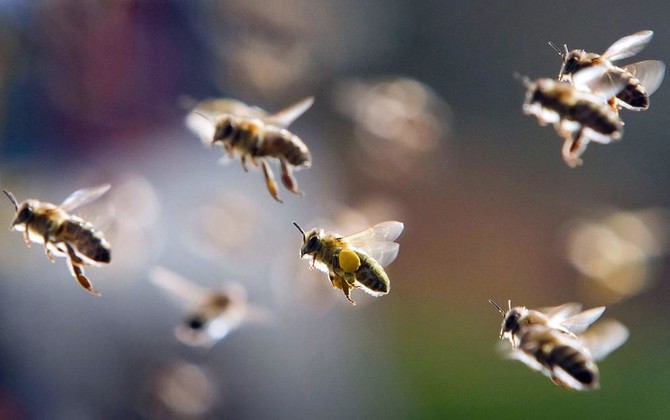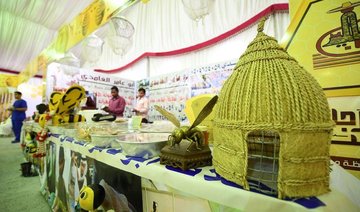JEDDAH: Saudi Arabia last week decided to implement a ban on the import of foreign bees in the next three years.
Minister of Environment, Water and Agriculture Abdul Rahman Al-Fadli acted against threats that imported bees pose to the local strain.
Beekeepers are threatened by many problems that imported bees bring with them. One of the biggest risks is cross-breeding. If the imported bees are bred with local bees, they will stain the purity.
The beekeepers are afraid that if the cross-breeding continues, the original breed might become extinct.
The Saudi Apis mellifera jemenitica is a breed that can survive in the extreme climatic conditions of Saudi Arabia, which many bees aren’t able to, and produce high-quality honey. They are smaller, slender and yellow in color.
It isn’t just the genetic manipulation; the imported bees attack local bees.
They are also the carriers of diseases that contaminate local bees and cause great loss; beekeepers do not just find a few dead bees when disease spreads — they find hive upon hive empty.
Beekeepers took these problems to the minister of environment and agriculture. The minister held a meeting with the president of Nahali Makkah Society and came up with the solution of entirely banning the import to preserve the bees and prevent extinction.
Consequently, fewer bees will produce less honey, so less honey will be available for selling locally or internationally, which might cause a disruption in the market.
The local honey market in Jeddah, located in Bab Makkah, is one of the largest in the Middle East.
Ten to 15 percent of the honey sold in this market is local; because of its scarce amount, this honey is purer and more expensive than the others.
When we talked to Abu Waheed, a local shop owner, about the effects of the ban on the market, he said: “Honey will become rare; therefore, the price will become much more than it already is. Local honey is 10 percent of my shop and it is three times more expensive than Pakistani, Yemeni or Russian honey.”
He added: “If there are fewer bees producing it, the price will rocket through the sky.”
Saudi Arabia to ban import of foreign bees by 2020
Saudi Arabia to ban import of foreign bees by 2020

Saudi minister holds talks with Chinese, EU officials on climate, global issues

RIYADH: Saudi Arabia's Minister of State for Foreign Affairs and Climate Envoy Adel Al-Jubeir received China's Special Envoy for Climate Change Liu Zhenmin in Riyadh on Sunday.
During the meeting, they discussed strengthening cooperation in climate action and environmental conservation, along with other topics of mutual interest.
Both officials also reviewed the Kingdom’s ongoing initiatives and achievements in this field, the Saudi Press Agency reported.
In a separate meeting, Al-Jubeir received the deputy secretary-general for political affairs at the European External Action Service, Olof Skoog, and his accompanying delegation.
The meeting reviewed international developments and the efforts being made to address them, in addition to discussing topics of mutual interest.
Sheikh Saleh bin Humaid to deliver Arafah sermon during Hajj 2025

- The day of Arafah (the 9th of Dhul Hijjah) is widely considered the pinnacle of Hajj, marking the most important day for pilgrims
- The sermon is delivered from Masjid Al-Nimra on Mount Arafat before Dhuhr and Asr prayers are performed together on Dhul Hijjah 9
RIYADH: Sheikh Saleh bin Humaid will deliver the Arafah sermon during this year’s Hajj, the Presidency of Religious Affairs announced on Sunday.
The day of Arafah (the 9th of Dhul Hijjah) is widely considered the pinnacle of Hajj, marking the most important day for pilgrims. Muslims around the world who are not performing the pilgrimage mark the day by fasting and engaging in worship.
The sermon is delivered from Masjid Al-Nimra on Mount Arafat before Dhuhr and Asr prayers are performed together on Dhul Hijjah 9.
Head of Religious Affairs of the Grand Mosque and the Prophet’s Mosque Sheikh Abdulrahman Al-Sudais thanked King Salman and Crown Prince Mohammed bin Salman for the appointment.
The appointment underscores the Kingdom’s global religious leadership, reflects its continued support for religious institutions, and exemplifies the leadership’s care for the two holy mosques, the presidency said.
Saudi deputy FM receives EU official in Riyadh

- A meeting was also held as part of the third round of political consultations between Saudi Arabia and the EEAS
RIYADH: Saudi Deputy Minister of Foreign Affairs Waleed Elkhereiji received Olof Skoog, deputy secretary-general for political affairs at the European External Action Service, and his accompanying delegation, in Riyadh on Sunday.
During the meeting, they discussed bilateral relations between the Kingdom and the EU and other topics of common interest, the Foreign Ministry wrote in a post on X.
A meeting was also held as part of the third round of political consultations between the Kingdom and the EEAS. Senior officials from both sides participated in the session, chaired by Raed bin Khalid Qarmli, director-general of the general directorate of policy planning at the Saudi Foreign Ministry, with Skoog representing the European side.
Pakistani ambassador to Saudi Arabia meets with CEO of Diriyah Gate Development Authority

- The meeting focused on strengthening Saudi-Pakistani ties in the field of heritage and culture
RIYADH: Ahmad Farooq, Pakistan’s ambassador to Saudi Arabia, met with Jerry Inzerillo, CEO of Diriyah Gate Development Authority in Riyadh.
The meeting focused on strengthening Saudi-Pakistani ties in the field of heritage and culture, the Pakistani Embassy wrote in a post on X on Sunday.
The ambassador presented Inzerillo with a painting from his own Diriyah-themed series, created to celebrate the Kingdom’s history and heritage.
He also presented him with a made-in-Pakistan FIFA-standard football “symbolizing Pakistan’s craftsmanship and the mutual spirit of friendship.”
Saudi reserve engages pilgrims on biodiversity

- Pilgrims were welcomed at Al-Shuqaiq in the Jouf region, where more than 4,000 gifts reflecting the reserve’s history and conservation efforts were distributed
RIYADH: Hajj pilgrims arriving in the Kingdom by land were introduced to projects and initiatives of the King Salman bin Abdulaziz Royal Reserve Development Authority.
The initiative aims to enhance biodiversity, restore vegetation and breed endangered species to create a more sustainable natural environment.
The authority also distributed educational brochures to raise awareness about environmental preservation, the Saudi Press Agency reported.
Pilgrims were welcomed at Al-Shuqaiq in the Jouf region, where more than 4,000 gifts reflecting the reserve’s history and conservation efforts were distributed.
Visitors were informed about the reserve’s environmental heritage, biodiversity, and commitment to sustainable ecological stewardship, the SPA added.
The authority works to preserve biodiversity by protecting habitats and creating safe environments for wildlife and plants to thrive.
Its achievements include planting more than 2.4 million trees, scattering four tonnes of native seeds and rehabilitating 250,000 hectares of degraded land.
The reserve hosts more than 290 documented bird species — about 58 percent of those recorded in the Kingdom — and includes five internationally recognized important bird areas.
Covering 130,700 sq. kilometers, the King Salman Reserve is the largest natural terrestrial reserve in the Middle East, spanning four administrative regions: Jouf, Hail, Northern Borders, and Tabuk.




















